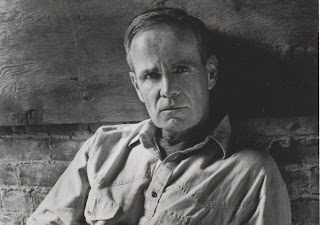Never For A Lazy Sunday
After reading DeWitt’s The Sisters Brothers, I began his first
novel Ablutions, having ordered on the strength of his superlative sophomore
book. Its dark bartender narrative, however, didn’t engage me and I soon gave
up. That much observed ennui and despair without any sense of a comic or even
sardonic overview just didn’t have the capacity to maintain my interest. It could
be that the brilliance of The Sisters Brothers cast too daunting an
expectation.
So I turned to my recent charity shop purchace of Cormac McCarthy’s No
Country for Old Men, my first McCarthy read [I am behind the times, this
book itself published in 2005, though like many I’d seen the Coen brothers’
film]. If Ablutions appears saloon dark and dirty, No Country...
is the blackest and bleakest of universal presentations, though pointedly set
in 1980s America, Texas to be precise, so it is best to see it as socio-historically
and culturally a Western universalising, even a modernised Wild West metaphor.
What it does possess is a dark humour to counter-balance its nihilism.
Sheriff Bell has a homespun philosophical wit that allows him to observe wryly
on the things that abhor, frighten and disappoint him about the world as it is.
Even the evil Chigurh has his comic assessments, either through internal narrative
or dialogue when thinking about or relaying directly to the person he is about
to kill.
The themes of honour and duty are prevalent ones, and McCarthy presents
them with an amazing insight into their complexities. Sheriff Bell has an ‘old-fashioned’
commitment to serve and protect the citizens who fall within his jurisdiction,
though he would extend this to anyone in genuine need because that is the way
he was brought up. These ‘old-fashioned’ values are for Bell the ones upon
which his country/county [an important symbolism as well as linguistic
similarity] have been built and which are now under absolute threat by the modern
world, or the world of the 80s when the story is set. The ostensible threat
comes from narcotics in every aspect of its grip on the country/county/[world]:
the effects of the drug itself, the criminals who buy and sell it, the ‘dopes’
who take it, the horrific consequences of this, and ultimately the greed and
dispassion which underpins and grows from it. The main consequence of this in the novel is a multitude of killings. McCarthy's detailed description of these and the guns that facilitate
it provides an astonishingly informed and clinical narrative.
The relentless, remorseless Chigurh has his own code of honour which is
to carry out his commitment to a job whatever the cost. The cost is usually
killing someone or many people and he is unstoppable in this commitment. The
only iota of escape offered to occasional imminent victims – if they even have
a moment of such opportunity – is the flip of a coin, which in the two cases it
is offered doesn’t even work in their favour. Chigurh’s world and control over
it is that certain – even chance has no chance of changing the inevitable.
Other key characters are Moss, somewhere in the middle of good-guy Bell
and bad-guy Chigurh, a Vietnam vet and welder who stumbles on that very nightmare
consequence of this drug-corrupted modern world and in being tempted to benefit from
this, essentially launches the story with its multiple escapes and chases, his
own existential greed tempered by not having been directly involved in the existence
of the money he decides to take as well as wanting mainly to improve his and
his wife’s quality of life; his wife Carla Jean whose Christian beliefs are
frankly not up to competing with what is going on at this time, and Bell’s wife
Loretta who loves her husband unconditionally and provides him with stoical
support as well as a colossal wisdom: the closing scenes of these two
reflecting on and talking about what their life and the world in general has
become provides the book’s most perceptive philosophy
There is so much more that I have left out – like Bell’s
wartime secret – but that’s for you to read, but also the fact that for all of
its simple narrative, driven by hypnotically realistic and/or surreal dialogue,
it is packed with depths and complex tangents. I don’t know if the following Times recommendation on the back cover
blurb is taken out of context, but it is so woefully bereft of touching on this
book’s impact and significance that it is genuinely hilarious:
A Western thriller
with a racy plot and punchy dialogue. Perfect for a lazy Sunday.


No comments:
Post a Comment